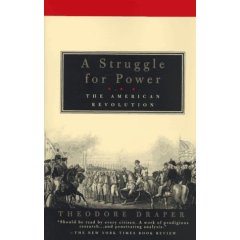A Struggle for Power

"...All historical accounts are premised on some conceptual framework, whether their authors acknowledge it or not. Sadly, many historians who deny that they are “captive to narrow constructs” but rather “choose the method that is best in each case” are prisoners of implicit models that not only vary but all too often contradict each other. In contrast, Draper is very forthright about his thesis and consistent in his approach. He lays out his framework of power early on, relates each topic to it, and closes on the same note. This tactic works to his advantage by making his argument easier to trace and ultimately more convincing.
Power in this case has to do with who controls the American government—more specifically, particular functions of that government. For almost a century and a half, the British allowed the Americans to provide such local governmental services as law enforcement and public works. How they provided them hardly affected the rest of the empire and would have been awkward to manage from London in any case. However, American contacts with foreign parties, in either trade or military affairs, were considered imperial prerogatives. But the British government devoted almost none of its own resources to these functions, as Draper writes, “ruling the colonies on the cheap.”
By the middle of the eighteenth century, the American colonies had already been honing their own independence for more than a century. The imperial government had imposed taxes and regulations on the Americans’ foreign commerce, but the Americans evaded or ignored many of the most onerous burdens. The British never collected taxes for the military protection they provided the Americans; rather, they depended on an informal understanding that the Americans should contribute to military operations during wars by contributing supplies, troops, and naval bases. The net effect was that no formal arrangement was ever created to exert the power—à la Draper—that the British believed was their prerogative..."
<< Home